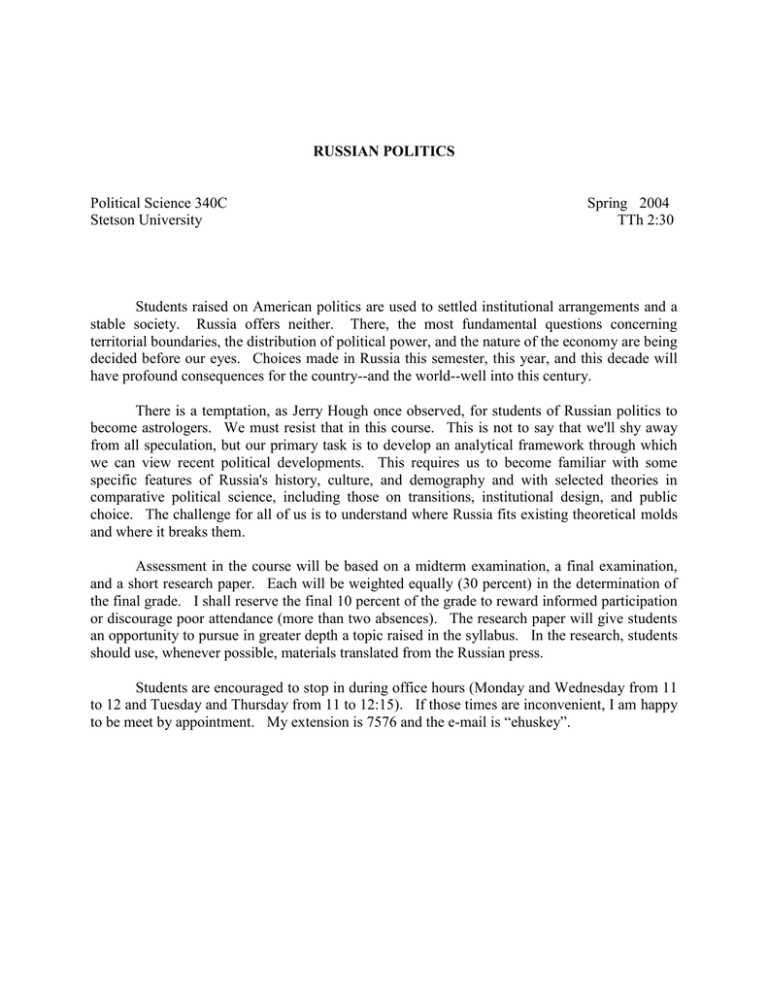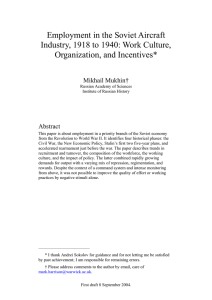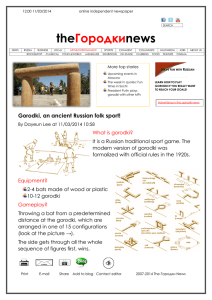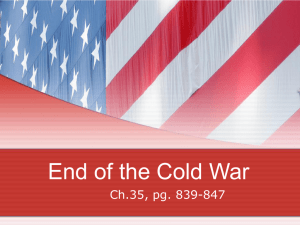pe340c huskey f2004
advertisement

RUSSIAN POLITICS Political Science 340C Stetson University Spring 2004 TTh 2:30 Students raised on American politics are used to settled institutional arrangements and a stable society. Russia offers neither. There, the most fundamental questions concerning territorial boundaries, the distribution of political power, and the nature of the economy are being decided before our eyes. Choices made in Russia this semester, this year, and this decade will have profound consequences for the country--and the world--well into this century. There is a temptation, as Jerry Hough once observed, for students of Russian politics to become astrologers. We must resist that in this course. This is not to say that we'll shy away from all speculation, but our primary task is to develop an analytical framework through which we can view recent political developments. This requires us to become familiar with some specific features of Russia's history, culture, and demography and with selected theories in comparative political science, including those on transitions, institutional design, and public choice. The challenge for all of us is to understand where Russia fits existing theoretical molds and where it breaks them. Assessment in the course will be based on a midterm examination, a final examination, and a short research paper. Each will be weighted equally (30 percent) in the determination of the final grade. I shall reserve the final 10 percent of the grade to reward informed participation or discourage poor attendance (more than two absences). The research paper will give students an opportunity to pursue in greater depth a topic raised in the syllabus. In the research, students should use, whenever possible, materials translated from the Russian press. Students are encouraged to stop in during office hours (Monday and Wednesday from 11 to 12 and Tuesday and Thursday from 11 to 12:15). If those times are inconvenient, I am happy to be meet by appointment. My extension is 7576 and the e-mail is “ehuskey”. Page 2 I. THE RUSSIAN POLITICAL INHERITANCE 1. Lands and peoples Examine carefully maps of Russia that illustrate physical, cultural, and political geography (Russian Studies Center or DuPont Ball Library). 2. Revolution, Reform, and Reaction in Russian History R. Tucker, “The Image of Dual Russia,” in The Soviet Political Mind, pp. 121-142. T. von Laue, Why Lenin? Why Stalin?, pp. 37-51. M. McAuley, Soviet Politics: 1917-1991, pp. 1-23. II. THE SOVIET EXPERIMENT 1. Building Communism, 1917-1953 McAuley, Soviet Politics, pp. 24-61. W. Leonhard, Child of the Revolution, pp. 17-69. S. Bialer, Stalin's Successors, pp. 7-46. 4. Reforming Communism, 1953-1988 McAuley, Soviet Politics, pp. 61-88. Conversations with Gorbachev, pp. 1-66. 5. Dismantling Communism, 1988-1992 (October- McAuley, Soviet Politics, pp. 89-123. Conversations with Gorbachev, pp. 66-213. A. Dallin, "The Causes of the Collapse of the USSR," Post-Soviet Affairs December 1992), pp. 279-302. Anna (film by Nikita Mikhalkov) Page 3 III. THE POLITICS OF TRANSITION 1. Conceptualizing the Transition from Communism A. Brown, Contemporary Russian Politics, pp. 455-498; 363-366. 2. A Survey of Russia’s Political History since 1991 No readings. MIDTERM IV. A STATE AND SOCIETY TRANSFORMED UNDER YELTSIN? 1. The President as Republican Monarch Brown, pp. 9-45. 2. The Parliament and Executive-Legislative Relations Brown, pp. 99-130. 3. Elections Brown, pp. 151-207. 4. The Formation of Russian Parties Brown, pp. 211-243. 5. Public Opinion and the Media Brown, pp. 289-342. Page 4 6. Moscow’s Struggle with the Provinces Brown, pp. 343-354; 369-411; 499-510. V. CROSSCURRENTS OF DEMOCRACY AND AUTHORITARIANISM UNDER PUTIN 1. The Transition within The Transition: Yeltsin Cedes Power Shevtsova, pp. 1-62. 2. The Battle Joined: Putin Against the Oligarchs, Regions, and Parliament Shevtsova, pp. 63-156. 3. Consolidating Democracy or Authoritarianism? Shevtsova, pp. 157-214. E. Huskey, “Speedy, Just, and Fair? Russian Legal Reform under Putin.” 4. The Elections of 2003-2004 and the Melding of Party and State Shevtsova, pp. 215-254. 5. Conceptualizing the Future Shevtsova, pp. 255-270. Brown, pp. 513-568. FINAL EXAMINATION Saturday, May 1, 8-10am





